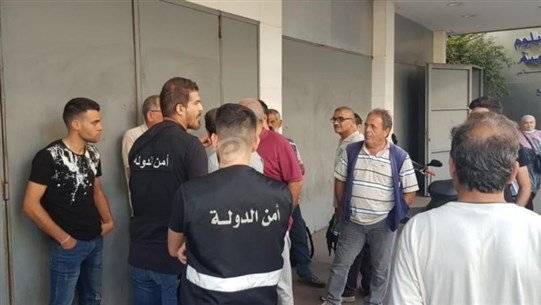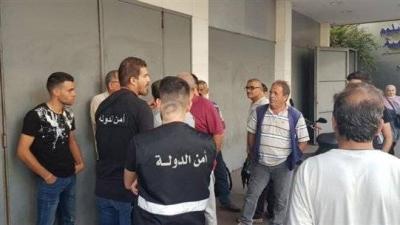After a ten-day closure following assaults by depositors seeking their funds, Lebanese banks in Sidon reopened their doors, as did banks across various regions of Lebanon. However, the reopening appeared limited, characterized by confusion and a series of issues, with strict protective measures at their reinforced entrances. The opening day varied from one bank to another, but they shared the commonality of heightened security measures. Some banks employed guards from "private companies" who interacted with customers in a rough and unkind manner, forcing depositors to wait outside, citing new measures that allowed only four people inside each bank at a time. This led to long queues and wait times for those trying to make withdrawals or conduct transactions.
Ali Hijazi, waiting for his turn to complete a transaction, stated to "Nidaa al-Watan," "The closure and reopening are the same for us depositors," indicating that "the reopening seems superficial, but effectively the closure is still in place, and work is not being executed. There appears to be an attempt to obstruct all transactions, which is unacceptable." He insisted, "We want our rights and our funds that are unjustly withheld, and then they can do whatever they want."
At the same time, ATM machines were crowded with citizens trying to withdraw their limited savings. It was mentioned that "the Lebanese currency was available, but the dollar was not, which caused an explosion of anger, especially among employees who flocked to banks to withdraw social assistance valued at $55. They were shocked to discover that the green currency was unavailable, while withdrawing it from the bank in some places required an appointment and long waiting."
"Nidaa al-Watan" observed several scenes, including the fact that many customers turned back upon learning of the complicated measures in place. Some described these as "humiliation and punishment" on top of "the detention of their funds." Employees attended for specific tasks, such as filling ATMs with Lebanese pounds or completing some previous transactions without executing any new ones. Moreover, most banks closed early, before their previously scheduled times. There were also reports of arguments between citizens and security guards from private companies due to the prohibition on entry to banks even for minor administrative inquiries. Additionally, some banks resorted to secondary entrances to allow approved depositors or business owners entry, while maintaining strict measures for individual transactions. The General Directorate of General Security deployed foot patrols to maintain order and intervene in emergencies or disputes.
Moussa Abu Alifa, waiting impatiently, expressed that "the measures taken at the banks were unexpected and foreshadow many problems if they continue, especially with the beginning of the month and the rush for salary withdrawals," stressing that these measures "not only embarrass the depositor but also represent the final nail in the coffin of any remaining trust in banks." He emphasized, "A quick solution is to restore small deposits... or everyone should head to court to file lawsuits."
**Security Council Meeting**
As banks resumed operations amidst fears of renewed invasions, alongside the security situation in the South Governorate, including Palestinian camps and especially the city of Sidon, this was the focus of a meeting held by the Southern Sub-Security Council at the government Serail in Sidon, chaired by Acting Governor Amin Secretary Nikoula Abu Daher on behalf of Governor Mansour Dwe, who is currently outside Lebanon. The meeting was attended by the public prosecutor in the South, Judge Raheef Ramadan, and military and security leaders.
The meeting concluded with a series of decisions, including increasing the number of security patrols to assist and support in the South Lebanon governorate, particularly in Sidon. There was a commitment to continuing coordination and cooperation among all military and security agencies under the supervision of the competent judiciary, and a strict approach to necessary measures aimed at controlling violations and referring offenders to the appropriate legal authorities.




